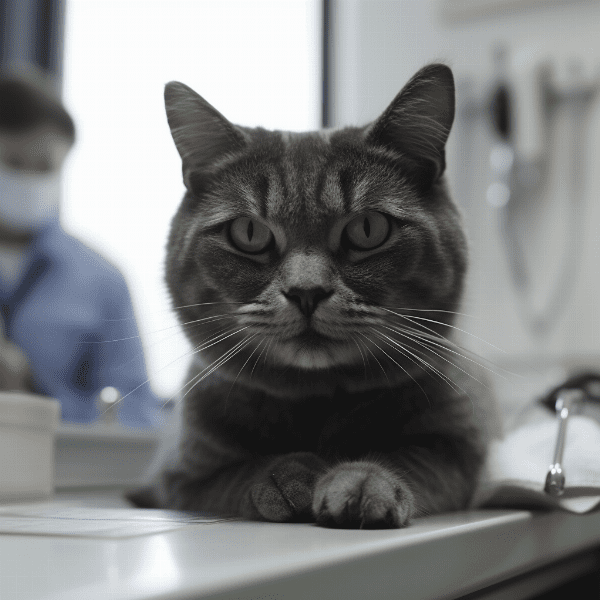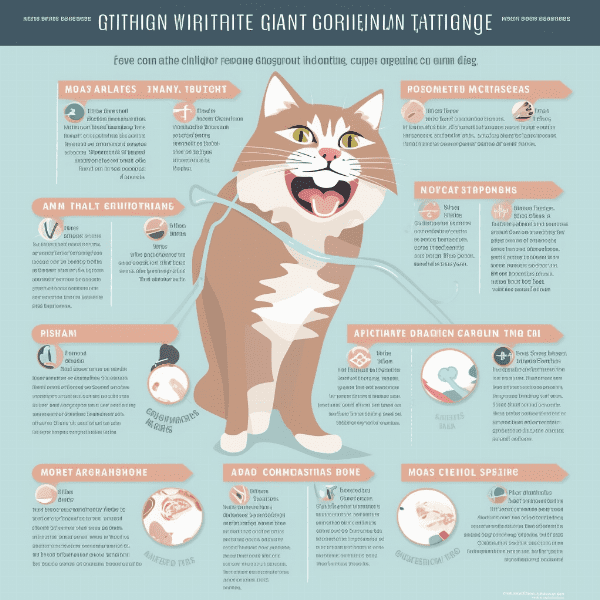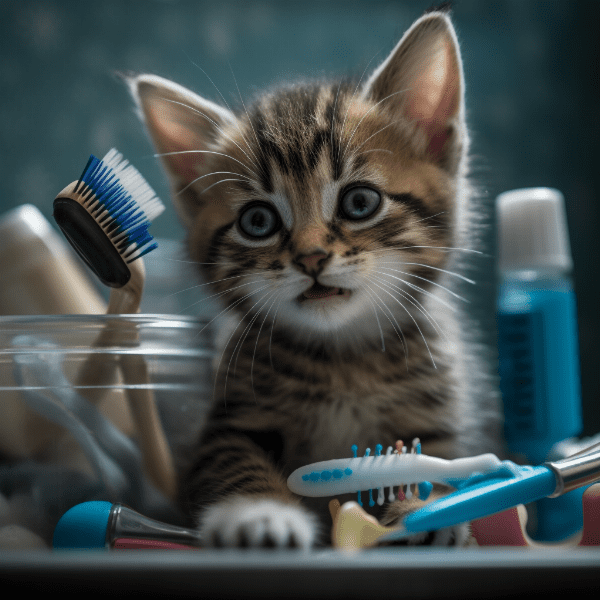Table of Contents
- Understanding Feline Tooth Infections
- Causes of Feline Tooth Infections
- Common Symptoms of Feline Tooth Infections
- How to Recognize Early Signs of Feline Tooth Infections
- When to See a Veterinarian for Feline Tooth Infections
- Diagnosing Feline Tooth Infections
- Treating Feline Tooth Infections
- Preventing Feline Tooth Infections
- Home Care for Feline Tooth Infections
- Importance of Regular Dental Checkups for Cats
Understanding Feline Tooth Infections
Feline tooth infections are a common problem that affects cats of all ages. These infections occur when bacteria invade the tooth and surrounding tissues, leading to inflammation, pain, and discomfort. In severe cases, untreated infections can even lead to tooth loss or the spread of infection to other parts of the body. Understanding the causes and symptoms of feline tooth infections is essential for maintaining your cat’s oral health.
Causes of Feline Tooth Infections
Feline tooth infections can be caused by a variety of factors, including poor dental hygiene, trauma to the tooth, and underlying health conditions. One of the most common causes of feline tooth infections is a buildup of plaque and tartar on the teeth. Over time, this buildup can lead to inflammation and infection in the gums and surrounding tissues. Trauma to the tooth, such as from a fall or injury, can also create an entry point for bacteria to enter the tooth and cause an infection. Additionally, cats with underlying health conditions, such as diabetes or kidney disease, may be at an increased risk of developing tooth infections.
Symptoms of Feline Tooth Infections
The symptoms of feline tooth infections can vary depending on the severity of the infection and the location of the affected tooth. Some common symptoms to watch for include:
- Bad breath
- Swollen or bleeding gums
- Difficulty eating or chewing
- Drooling or excessive salivation
- Pawing at the face or mouth
- Yellow or brown discoloration of the tooth
- Sensitivity to touch or pressure around the affected tooth
If you notice any of these symptoms in your cat, it is important to seek veterinary care right away. Early treatment can help prevent the infection from spreading and causing more serious health problems.
In summary, feline tooth infections are a common problem that can be caused by a variety of factors, including poor dental hygiene, trauma to the tooth, and underlying health conditions. The symptoms of feline tooth infections can vary, but may include bad breath, swollen or bleeding gums, difficulty eating or chewing, and sensitivity to touch or pressure around the affected tooth. Early detection and treatment are essential for maintaining your cat’s oral health and overall wellbeing.
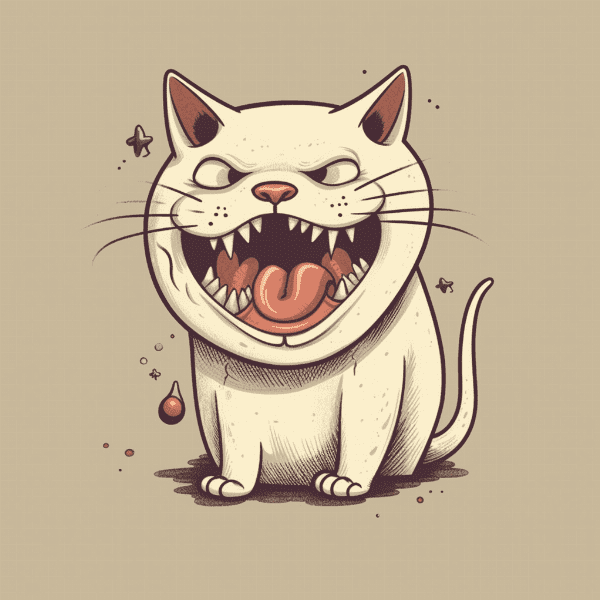
Causes of Feline Tooth Infections
Feline tooth infections can develop for a variety of reasons. Some of the most common causes include poor dental hygiene, trauma to the tooth, and underlying health conditions.
Poor Dental Hygiene
One of the primary causes of feline tooth infections is poor dental hygiene. When cats do not receive regular dental cleanings or their teeth are not properly brushed, plaque and tartar can build up on the teeth. This buildup can lead to gum inflammation and infection, which can eventually spread to the tooth itself. To prevent dental problems, it is essential to brush your cat’s teeth regularly and have their teeth professionally cleaned as recommended by your veterinarian.
Trauma to the Tooth
Another common cause of feline tooth infections is trauma to the tooth. Cats can experience tooth trauma in a variety of ways, including falls, fights with other animals, or chewing on hard objects. When a tooth is damaged, it can create an entry point for bacteria to enter and cause an infection. If you suspect that your cat has experienced tooth trauma, it is important to have them evaluated by a veterinarian.
Underlying Health Conditions
Finally, some underlying health conditions can increase a cat’s risk of developing tooth infections. For example, cats with diabetes may be more prone to gum disease, which can lead to tooth infections. Additionally, cats with kidney disease may have weakened immune systems, which can make them more susceptible to bacterial infections in the mouth. If your cat has an underlying health condition, it is important to work closely with your veterinarian to manage their overall health and prevent dental problems.
In summary, feline tooth infections can be caused by a variety of factors, including poor dental hygiene, trauma to the tooth, and underlying health conditions. Regular dental cleanings, prompt treatment of tooth trauma, and careful management of underlying health conditions can help prevent tooth infections from developing.
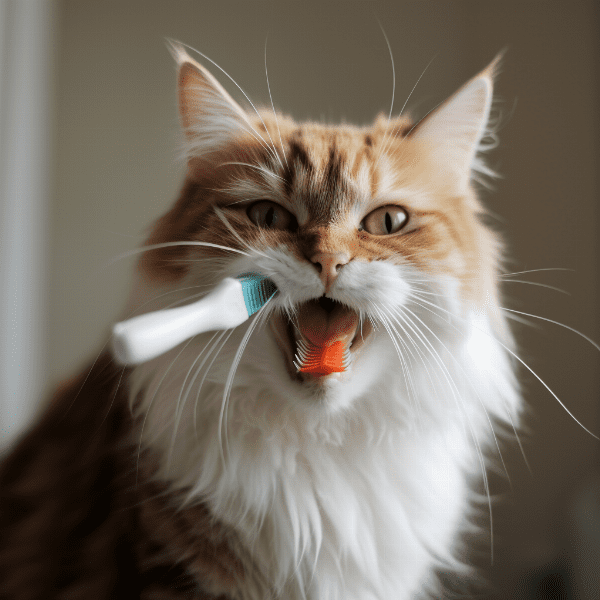
Common Symptoms of Feline Tooth Infections
Feline tooth infections can cause a variety of symptoms that can be painful and uncomfortable for your cat. Some of the most common symptoms to watch for include:
Bad Breath
One of the earliest signs of a feline tooth infection is bad breath. When bacteria begin to grow in the mouth, they can produce unpleasant odors that are noticeable even from a distance. If your cat’s breath smells foul, it may be a sign of a dental problem.
Pawing at the Face or Mouth
Cats in pain may also paw at their face or mouth in an attempt to relieve their discomfort. If you notice your cat pawing at their face or mouth, it may be a sign that they are experiencing dental pain.
.
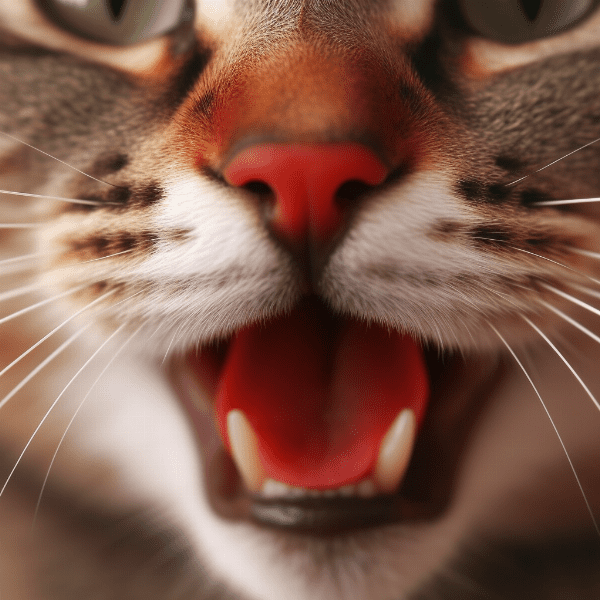
How to Recognize Early Signs of Feline Tooth Infections
Recognizing the early signs of feline tooth infections is essential for preventing the infection from spreading and causing more serious health problems. Here are some tips for identifying the early signs of a tooth infection in your cat:
Inspect Your Cat’s Teeth and Gums
Regularly inspecting your cat’s teeth and gums can help you identify any early signs of a tooth infection. Look for redness or swelling in the gums, discoloration of the teeth, or signs of bleeding. If you notice anything unusual, it is important to have your cat evaluated by a veterinarian.
Pay Attention to Bad Breath
Bad breath is often an early sign of a feline tooth infection. If your cat’s breath smells noticeably foul, it may be a sign of dental problems. It is important to note that not all cases of bad breath are due to dental problems, but it is always a good idea to have your cat evaluated by a veterinarian if you notice any changes in their breath.
.
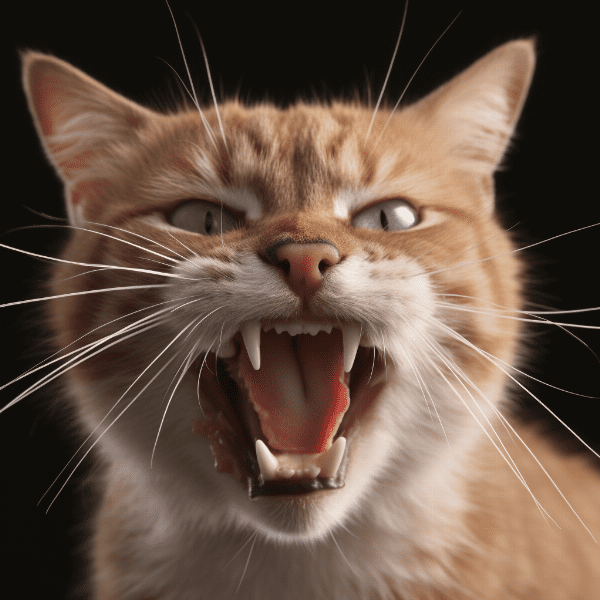
When to See a Veterinarian for Feline Tooth Infections
Feline tooth infections can cause pain, discomfort, and even more serious health problems if left untreated. Here are some signs that indicate it’s time to schedule an appointment with your veterinarian:
Persistent Bad Breath
Bad breath is often an early sign of a feline tooth infection. If your cat’s breath smells consistently foul, it may be a sign of dental problems. If the bad breath persists even after you have tried brushing your cat’s teeth or changing their diet, it’s time to see a veterinarian.
Difficulty Eating or Chewing
If your cat is experiencing tooth pain, they may avoid eating or only eat soft foods that are easier to chew. If your cat is having difficulty eating or chewing their food, it’s time to schedule an appointment with your veterinarian.
Swollen or Bleeding Gums
Swollen or bleeding gums can be a sign of a feline tooth infection. If you notice that your cat’s gums are red, inflamed, or bleeding, it’s time to seek veterinary care.
Changes in Behavior
Changes in your cat’s behavior can also be a sign of dental problems. If your cat is avoiding their food bowl or seems to be in pain when chewing, it’s time to have them evaluated by a veterinarian.
Yellow or Brown Discoloration of the Tooth
Discoloration of the affected tooth can also be a sign of a feline tooth infection. If you notice that your cat’s tooth has become discolored or is sensitive to touch or pressure, it’s time to see a veterinarian.
In summary, feline tooth infections can cause a variety of symptoms that can be painful and uncomfortable for your cat. If you notice persistent bad breath, difficulty eating or chewing, swollen or bleeding gums, changes in behavior, or discoloration of the tooth, it’s time to schedule an appointment with your veterinarian. Early detection and treatment are essential for maintaining your cat’s oral health and overall wellbeing.
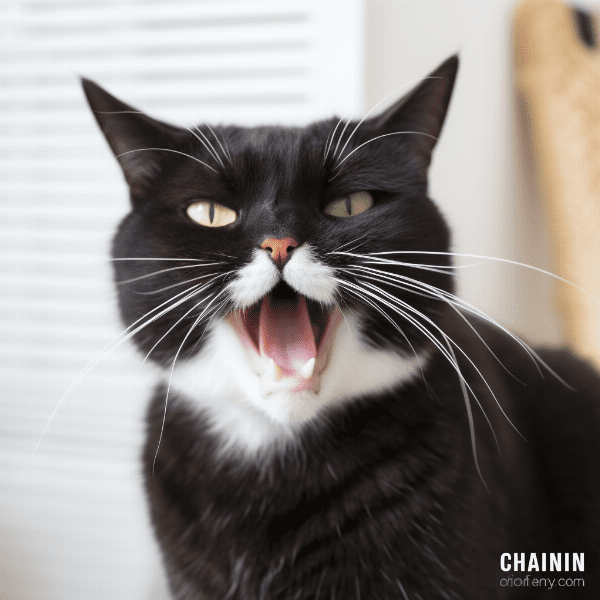
Diagnosing Feline Tooth Infections
Diagnosing a feline tooth infection typically involves a combination of a physical exam, a dental exam, and diagnostic testing. Here’s what you can expect during the diagnostic process:
Physical Exam
During a physical exam, your veterinarian will examine your cat’s overall health and look for any visible signs of dental problems, such as swollen or bleeding gums or discoloration of the teeth. Your veterinarian may also take your cat’s temperature and perform other diagnostic tests to evaluate their overall health.
Dental Exam
If your veterinarian suspects that your cat has a tooth infection, they will perform a dental exam to evaluate the extent of the infection. This may involve sedating your cat so that your veterinarian can thoroughly examine their teeth and gums. During the dental exam, your veterinarian will look for signs of inflammation, infection, and tooth decay.
Diagnostic Testing
If your veterinarian suspects that your cat has a tooth infection, they may also perform diagnostic tests to confirm the diagnosis. This may include X-rays or other imaging tests to evaluate the extent of the infection and identify any underlying problems, such as tooth decay or damage to the tooth root.
In some cases, your veterinarian may also perform blood tests or other diagnostic tests to evaluate your cat’s overall health and identify any underlying health conditions that may be contributing to the dental problem.
In summary, diagnosing a feline tooth infection typically involves a combination of a physical exam, a dental exam, and diagnostic testing. If your veterinarian suspects that your cat has a tooth infection, they may perform X-rays or other imaging tests to evaluate the extent of the infection and identify any underlying problems. Early diagnosis and treatment are essential for maintaining your cat’s oral health and overall wellbeing.
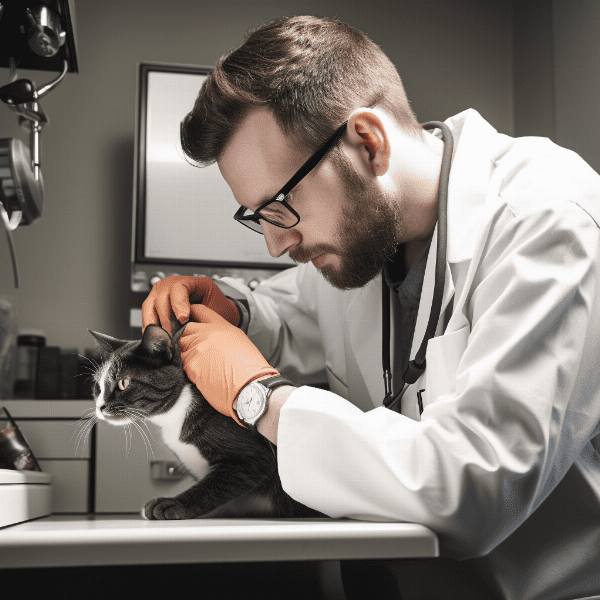
Treating Feline Tooth Infections
Treating a feline tooth infection typically involves a combination of dental treatments and medications. Here are some of the most common treatments for feline tooth infections:
Dental Cleaning
If your cat has a mild tooth infection, your veterinarian may recommend a dental cleaning to remove any buildup of plaque and tartar on the teeth. This can help reduce inflammation and prevent the infection from spreading. During the dental cleaning, your veterinarian may also extract any damaged or infected teeth.
Antibiotics
If the infection is more severe, your veterinarian may prescribe antibiotics to help fight the infection. Antibiotics may be administered orally or through injection, depending on the severity of the infection. It is important to give your cat the full course of antibiotics as prescribed to ensure that the infection is fully treated.
Pain Management
To relieve your cat’s dental pain, your veterinarian may also prescribe pain medications. This can help make your cat more comfortable and reduce the risk of complications from the infection.
Home Care
In addition to professional dental treatments and medications, home care is also an important part of treating feline tooth infections. This may include regular brushing of your cat’s teeth, feeding them a healthy diet that is low in carbohydrates, and providing them with plenty of fresh water to drink.
In summary, treating a feline tooth infection typically involves a combination of dental treatments, antibiotics, pain management, and home care. Early detection and treatment are essential for preventing the infection from spreading and causing more serious health problems. If you suspect that your cat may have a tooth infection, it is important to seek veterinary care right away.
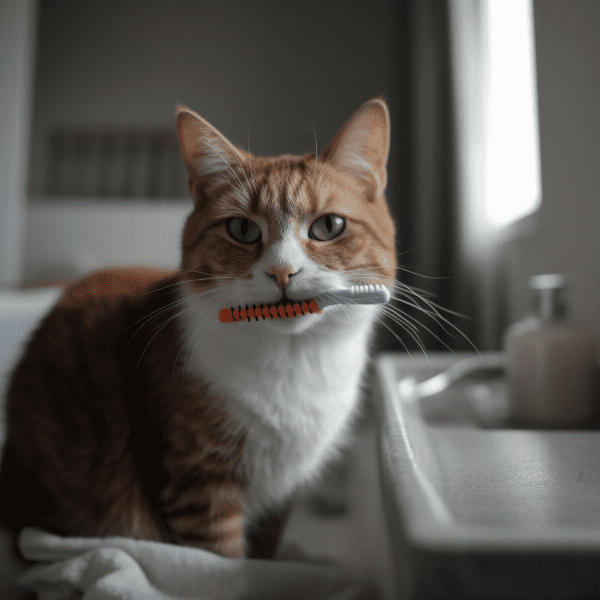
Preventing Feline Tooth Infections
Preventing feline tooth infections is an important part of maintaining your cat’s overall health and wellbeing. Here are some tips for preventing tooth infections in your cat:
Regular Dental Cleanings
Regular dental cleanings are one of the best ways to prevent feline tooth infections. Your veterinarian can perform a thorough dental exam, clean your cat’s teeth, and identify any potential problems before they become more serious. It is recommended to have your cat’s teeth professionally cleaned at least once a year.
.
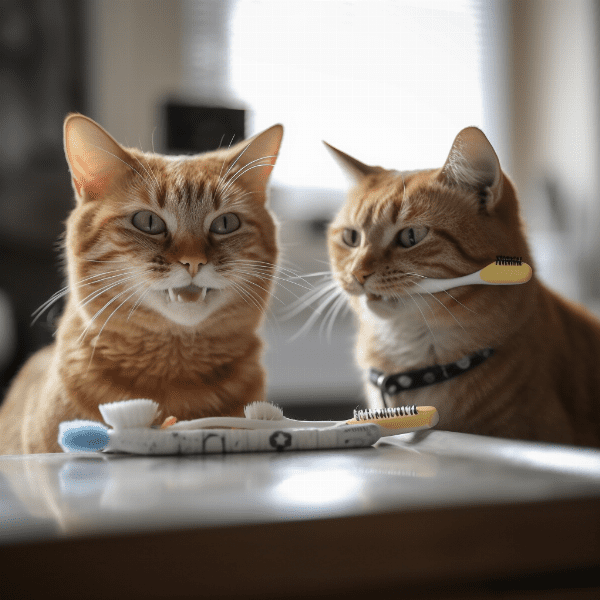
Home Care for Feline Tooth Infections
Home care is an important part of treating and preventing feline tooth infections. Here are some tips for caring for your cat’s teeth at home:
Brush Your Cat’s Teeth
Brushing your cat’s teeth regularly is one of the most effective ways to prevent tooth infections. Use a soft-bristled toothbrush and veterinary-approved toothpaste to brush your cat’s teeth. Start with just a few teeth at a time and gradually increase the number over time.
Provide Dental-Friendly Toys and Treats
Dental-friendly toys and treats can also help promote good oral health in cats. Look for toys that are designed to promote chewing and help clean the teeth. Additionally, dental treats can help clean the teeth and freshen your cat’s breath.
Feed a Healthy Diet
Feeding your cat a healthy, balanced diet can also help promote good oral health. Look for foods that are low in carbohydrates and high in protein, as this can help prevent the development of plaque and tartar buildup.
Monitor Your Cat’s Behavior
Monitor your cat’s behavior closely and watch for signs of dental problems, such as difficulty eating or chewing, bad breath, or pawing at the face or mouth. If you notice any of these signs, it is important to seek veterinary care right away to prevent the infection from spreading and causing more serious health problems.
Schedule Regular Dental Cleanings
Regular dental cleanings are also an important part of home care for feline tooth infections. Talk to your veterinarian about how often your cat should have their teeth professionally cleaned, and be sure to follow their recommendations.
In summary, home care is an important part of treating and preventing feline tooth infections. Brushing your cat’s teeth, providing dental-friendly toys and treats, feeding a healthy diet, monitoring your cat’s behavior, and scheduling regular dental cleanings can all help promote good oral health and prevent tooth infections.
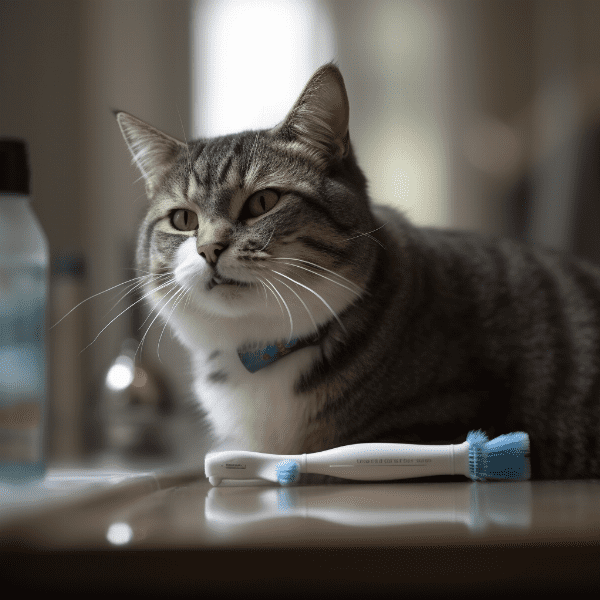
Importance of Regular Dental Checkups for Cats
Regular dental checkups are an important part of maintaining your cat’s oral health and overall wellbeing. Here are some reasons why regular dental checkups are so important:
Early Detection and Treatment of Dental Problems
Regular dental checkups can help identify dental problems early on, before they become more serious. During a dental checkup, your veterinarian can perform a thorough dental exam, identify any potential problems, and provide treatment as needed. Early detection and treatment are essential for preventing the development of more serious dental problems.
Preventing Tooth Loss
Dental problems such as gum disease and tooth infections can lead to tooth loss if left untreated. Regular dental checkups can help prevent tooth loss by identifying and treating dental problems early on.
Improving Your Cat’s Overall Health
Good oral health is essential for maintaining your cat’s overall health and wellbeing. Dental problems can lead to pain, discomfort, and even more serious health problems if left untreated. By maintaining good oral health through regular dental checkups, you can help ensure that your cat remains healthy and happy.
Saving Money in the Long Run
Regular dental checkups can also help save you money in the long run. By identifying and treating dental problems early on, you can avoid more expensive dental procedures in the future.
In summary, regular dental checkups are an important part of maintaining your cat’s oral health and overall wellbeing. By identifying and treating dental problems early on, you can prevent tooth loss, improve your cat’s overall health, and save money in the long run. Talk to your veterinarian about how often your cat should have dental checkups, and be sure to follow their recommendations.
